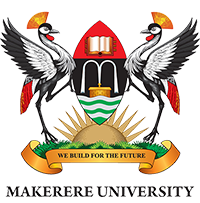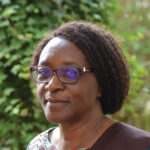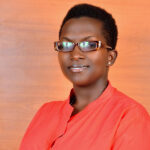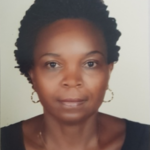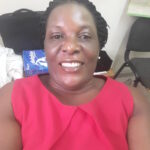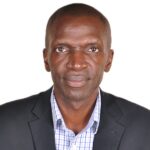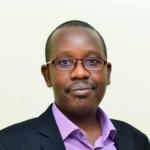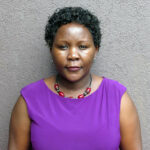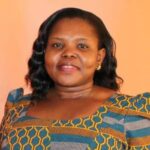“So I think the course content graduated over time to enable every participant to be more focused. Then really I got to see some topics that I did not anticipate like masculinity, the frameworks of gender and youth responsiveness, and addressing situations like putting some of this space into context. Really I feel that the course content was well developed and well thought through’ Man, social scientist.”
Man (social scientist)
“First of all, when I received the email. I was very excited to participate in this particular course, because, you know, sometimes honestly, I'm listening to my colleagues scientists at work talking about the gender issues in agriculture and agronomy, and me I was always thinking, how can we as agronomists be interested in gender? When I came to this course I think that I now understand that language a bit. Yeah, gender is very important for the transformation and performance of society. That was very clear on day one. Of course, the concepts regarding gender, that we don't know, for instance, gender awareness, gender-responsive, equality, equity and many others. From this course, I now really understand that gender is very important in agronomy. My expectation was met because I wanted to understand all this concept of gender and I got it.”
Man (agronomist)
“So I think the course content graduated over time to cover every participant to be more focused. Then really I got to see some topics that I did not anticipate like masculinity, the frameworks of gender and youth responsiveness, and addressing situations like putting some of this space into context. Really I feel that the course content was well developed and well thought through, and even helped to baptize many of us to really be firm believers than the initial skepticism. The trainer team justified why we are targeting women, why are we are targeting youth, and other sections of the population. Their constraints were explained too. But with science, it is difficult to convince me when things are not hypothetically proven. So if it's backed with science, I think I'm more convinced in the way that I believe that there is a methodology, and then there is guidance. The trainers provided the scientific justification. That is, if you repeat it in any other industry, you are likely to get the same or equal results. ”
Man (agricultural economist) from West Africa
“The issue of masculinity is something that I had never heard being said and it is still fresh in my memory. These things happen in communities but we don’t talk about them. Highlighting this in a gender-related workshop is really taking into consideration how men fail in trying to solve some gender-related issues. It was my first gender training and masculinity caught my attention in the extreme, that's quite interesting. When you look back in the communities we work with, men will always want to take their position and we should know how such matters affect our work. ”
Man (agronomist) from West Africa
“There was humanity, which was being celebrated. There are some trainings you go to that are mechanical. I really love the way we were respecting and giving our thanks to the professors or to the fellow colleagues there. It was, ‘we feel for you, it's not a machine work, a machine world. We are here, we are talking about humans”. Also, when we want us to be sensitive for gender and youth outside the world, we need to first be sensitive among the community-which we did so well.
”
Woman (social scientist) from South Asia
“What a training! I didn’t know one week can change a man…….. I feel totally new!
”
Man (social scientist) from East Africa
“I loved the delivery. I don't know whether it is a Makerere University kind of training, or if it is a GREAT kind of training, but it was an excellent delivery in general. Each trainer did well to address their gender-related topics and used different methods. You could see that in what they spoke and how they delivered it across. All of them were excellent and it is quite difficult to even mention names. Remember the one who told us to close eyes and imagine the woman farmer? It is still fresh in my memory. I still see that woman farmer that I saw when I closed my eyes.”
Man (agricultural economist) from West Africa
“I was really, really impressed by each of the professors because each one of them were coming from depth of knowledge. It was not superficial. Might be they were talking about certain topic for 20 minutes, because that's how any training program goes. But that was also reflective about the years of experience. They had an in-depth knowledge of the topics they were facilitating, they were comfortable and talking confidently. They were also relating with each participants. I think this delivery skill comes with age or years of experience. Remember we were from six continents and 27 countries represented. But the professors were able to connect quickly with each one of us. So whatever we were saying, they were able to connect it with their own, like Uganda country. Some were saying, ….well this happens in my country, …this also happens. They were also very, very, open to learn. So it was not that, okay, I am the professor, and I know my thing, so you listen to me. It was not like that. It was like, together, we will evolve in the training. ”
Woman (social scientist) from South Asia
“Looking at the number of days, the powerful and much needed topics we were addressing, the content was very, very well defined. It was in stages and progressive. You understand first why you are there. you make yourself comfortable with the team, and that was very important. These are very sensitive issues working on gender or working on youth. So the participants were made very comfortable and they opened up. That was one of the important aspect of this whole training program. I could come back with how important it is that when you train on such topics to make participants open, and also participants feel the responsibility of why they are there. ”
Woman (social scientist)
“Another thing which I got through the intercontinent cross-cultural learning was that the women are same everywhere. So the field visit, which we did, we saw that how when we were interviewing the women, they came with the children and the fellow professors had to take care of the children when we were interviewing the mothers. So I could see very much, I could relate it with Indian context. When we go to the Indian rural area to work, it's not different. Even the men interacting with the men. And that was a beautiful part of this intercultural learning where you guys took us to the field because there, we, we actually work for field. Even if we go to policy makers, we want the impact to set on the field. And there I could see the same response from the men of the household and the female of the household, the same kind. The women will take a step back to respond, male will dominate. The same that was happening in the village of Kigali happens like thousands and thousands of kilometers away in the village of Bihar India. So this was a very, very powerful cross-learning exercise. And also, another word I would say was that youth which was introduced was also a very powerful learning that, when we interact with women, there is youth as well. Yes, and when we interact with male farmer, there are youth sections as well. So when we talk about the future of agriculture, youth do play a very important role.”
Woman (social scientist) from South Asia
“Meeting great minds that have wide range of experiences in this field, learning and unlearning new things that are of great help in my career as an agronomist. Also great participants! I mean haven't bonded with new beings like this in decades. As an agronomist and also extentionist, I found a lot of pending answers to my questions after the training course.
”
Woman (biophysical scientist)
“When we talk about excellence in agronomy, we are talking about scaling. And scaling cannot be done by research institutes like ours alone or only by them or by us, right? We need scaling partners. The scaling partners who came were really amazing. They got why they were there. So when a person coming from public government sector, or private sector own the importance of evidence, that is important, very important. We from research background know why evidence is important. We know why we should accept there is a gap, but with many a time with policymakers or the different professional background we come from,but expertise, it is sometimes difficult to accept evidence. But here I found that that ice breaking with demand partners happened at the very beginning. So now when I talk to my scaling partner, they know what I'm talking about. They know why I am talking about questionnaire to be designed and implemented by government offices. So that's, that's another very powerful thing of this training, I would say you made my work easy.”
Woman (social scientist)
“It was a power pack training program. And when I come back and see the impact of it, it is about delivering to other partners, facilitators, and all these scientists within my team, and then how do we have that hard skill of analysis. Like I'm a qualitative scientist, so in my work, I want to always know why things are happening. ”
Woman (social scientist) from South Asia
